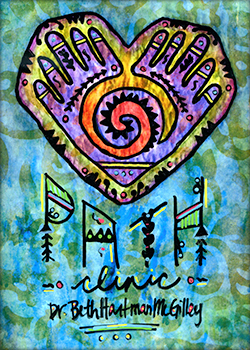On the Being and Telling of the Experience of Anorexia: A Therapist’s Perspective
Beth Hartman McGilley, PhD, FAED, CEDS
The Renfrew Perspective, (2000, Spring) 5(2), p. 5-7.
At the 1994 Renfrew Conference, I was privileged to speak on a panel entitled: “Perspectives on the Inside Out: Therapists Who Carry the Experience.” The invitation to address the notable omission of discourse on being a “recovered therapist” was a weighty prospect that I didn’t take lightly. I was fully aware that I was not alone as a recovered anorexic in the community of eating disorders specialists, but the conspicuous lack of similar acknowledgement was a potent silencer. A “don’t ask, don’t tell” mentality seemed the abiding dictum in our field, compounded by the still pervasive social stigma associated with mental illness in the community at large. The implied hypocrisy fueled the secrecy–a rather anorexic solution to a dilemma of such ample significance, if you will. One blessing of being recovered is that at some point, the need to be real without apology becomes more pressing that the needs to please, resist conflict or maintain the status quo. Ultimately, speaking on the panel was an irrevocably liberating, confirming and healing process. My hunger for a fuller sense of honesty and truth-telling in our field was simultaneously fed and reawakened. I make this point now because “coming out” to my professional colleagues then outweighs any experience I’ve had dealing with the same considerations with my patients. Relatively speaking, that has been a cake walk, albeit a multidimensional, thoughtfully choreographed one! Once again, I welcome the opportunity to revisit this topic for The Renfrew Perspective.
